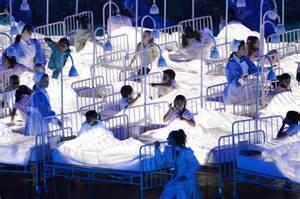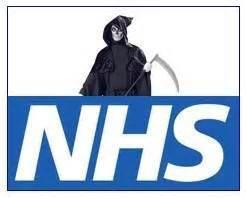
Children used as NHS propaganda during the 2012 London Olympics Ceremony
Daily Mail: Thousands of children are being taken to casualty needlessly because their GPs are prioritising adults, a report shows. Some parents no longer feel they can take sick youngsters to their local surgery so they end up being treated as ‘second-class citizens’ in hospital. More than 8,000 ‘potentially avoidable’ extra admissions for conditions such as asthma and diabetes have been logged every year since doctors were allowed to opt out of evening and weekend work.
Out-of-hours care was handed to private firms, NHS trusts and GP co-operatives under a 2004 contract that primarily rewarded the care of chronically ill adults. These changes have ‘squeezed out’ the care of children, according to researchers from Imperial College London.
They said parents were finding it hard to get daytime appointments for their youngsters because GPs were overloaded with adult patients. Confidence in out-of-hours services has also fallen.
Sonia Saxena, a GP and lead author of the study, suggested parents ‘may be getting the message’ from doctors that general practice was not now a place to take a child. ‘They have been squeezed out,’ she said. ‘Consulting rates have gone up for adults but remained the same for children.
‘The incentivised scheme aimed at improving quality of care provided mainly to adults possibly detracted focused care from children. We have clear evidence that the unintended consequences have been that children whose care was not prioritised have had to turn to the emergency services, which in many cases results in poorer health outcomes in children and waste in the health system.’
The Imperial researchers studied data on 7.8 million unplanned hospital admissions among under-15s from 2000 to 2012. They said the GP contract changes had led to an eight per cent increase in short-stay admission rates for children with chronic conditions such as diabetes, epilepsy and asthma. This was equivalent to 8,500 additional short-stay hospital admissions a year. This was significant because these were children with ‘primary care sensitive’ conditions – where better GP care is seen as vital.
This 8 per cent rise was over and above the 3 per cent annual increase, according to the study published in the journal Annals of Family Medicine and funded by the National Institute for Health Research. Avoidable admissions are expensive for the NHS, costing up to £500 a child compared with £30 for a GP consultation.
Dr. Saxena called for a rebalancing of financial incentives and better ways of working, including more telephone access to GPs. She said children risked being treated as ‘second-class citizens’.
However, Maureen Baker, who chairs the Royal College of GPs, insisted there was no evidence of a causal link between out-of-hours GP access and hospital admissions.
She said: ‘Any increase is most likely due to some hospital doctors taking a more cautious approach to admitting children for overnight observation, a response to pressure to meet the A&E four-hour target, and a lack of ability to discharge patients back into the community. It is a myth that GPs do not work outside of normal working hours – and in an emergency patients will always have access to a family doctor.’
Professor Baker said her college wanted 8,000 more GPs in England to combat severe shortages as well as a bigger share of the overall NHS budget.
Dr. Richard Vautrey, who is deputy chairman of the British Medical Association’s GP committee, said: ‘This research ignores the important fact that since 2004 there has been a substantial increase in pressure on the NHS from rising patient demand, falling resources and staff shortages that have particularly affected general practice. GPs see and treat large numbers of children every day and are experts in this area. The GP contract does focus on ensuring good standards of care for children with asthma. It is a key part of the care GPs deliver and unlikely to be an explanation for the changes in hospital admissions seen in this research.’
A Department of Health spokesman said: ‘The 2004 GP contract broke the personal link between doctor and patient, piled on red tape and put huge pressure on A&Es. By 2020, we’ll ensure everyone can see a family doctor seven days a week, empowering hard-working GPs as the cornerstone of the NHS.’
Last month a damning report showed that care standards were far worse in areas where GPs had opted out of evening and weekend work. Locum doctors provided by private firms were more likely to turn up late, less trusted and offered a ‘very poor’ overall service, according to the study.

DCG

